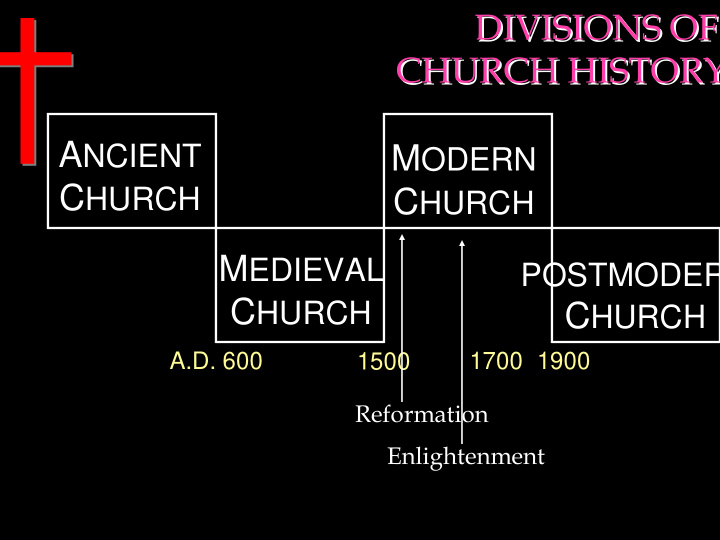



DIVISIONS OF DIVISIONS OF CHURCH HISTORY CHURCH HISTORY A NCIENT M ODERN C HURCH C HURCH M EDIEVAL POSTMODER C HURCH C HURCH A.D. 600 1500 1700 1900 Reformation Enlightenment
THE ANCIENT CHURCH THE ANCIENT CHURCH A.D. 100-600 A.D. 100-600 AGE AGE AGE AGE AGE AGE OF THE OF THE OF THE OF THE OF THE OF THE APOSTOLIC APOSTOLIC APOLOGISTS APOLOGISTS THEOLOGIANS THEOLOGIANS FATHERS FATHERS A.D. A.D. A.D. A.D. A.D. A.D. A.D. A.D. 100 150 300 600 100 150 300 600
DOGMA, derives from a Greek term “ dokein ” (it seems). “ a decree, a decision, or a command. ” In the New Testament it became attached to the findings of an ecclesiastical body such as in Acts 16:4 ( dogmata ).
DOGMA, “ the study of confessional statements; the study of creeds related to either the early ecumenical creeds of the church, or later creeds of different churches. ” Eastern Orthodox Roman Catholic Lutheran
Doctrine, “ that which is taught; what is held, put forth as true or supported by a teacher, a school, or group. ” In this sense doctrine denotes teaching as distinguished from dogma which denotes only such teaching as is part of the written confession of the church.
Doctrine=teaching Doctrine= abstract theology Doctrine=policy, procedures
THE COMPONENTS OF DOCTRINAL FORMULATION A QUESTION-ANSWER EXERCISE THE SCRIPTURES QUESTIONS-------CHURCH REFLECTION-----FORMULATED REPLIES DOCTRINE
The Basis of Knowledge The Basis of Knowledge METHOD Autonomous Systems STARTING POINT SYSTEM Innate ideas Independent use Of Perception RATIONALISM Faith in human of logic & reason ability. Sense perceptions Independent use of EMPIRICISM External experience; logic & reason Scientific method; Faith in human ability Independent, Inner, private Nonlogical, experience; intuition MYSTICISM nonrational, Faith in human ability nonverifiable. Viewpoint Combination of above; Historical Divine TRADITION institutional, creaturely validation authority Dependent use of Objective REVELATION logic and reason revelation of God
PRE-MODERN EPISTEMOLOGY Divine Omniscience Human Knowledge: Derivative, Dependent
GOD GOD GNOSTI CI SM (Pure Spirit) (Pure Spirit) knowledge emanations DUALISM demiurge man world
AUTHORITY IN THE EARLY CHURCH AUTHORITY IN THE EARLY CHURCH GOD A succession of bishops from God through Christ CHRIST in the churches. A single apostolic successor in each APOSTLES church (a bishop). An emphasis on a THE APOSTLES’ linearly passed SUCCESSORS tradition of doctrine.
The Old Roman Symbol (w/ Apostle’s Creed) I believe in God the Father Almighty, maker of heaven and earth . And in Jesus Christ, His only Son, our Lord who was conceived by the Holy Ghost, born of the Virgin Mary, who suffered under Pontius Pilate, was crucified, dead , and buried; He descended into Hades , the third day He rose from the dead, ascended into heaven, and sitteth on the right hand of God the Father Almighty ; from thence he shall come to judge the quick and the dead. And I believe in the Holy Ghost; the holy catholic Church; the communion of saints; the forgiveness of sins The resurrection of the body: and the life everlasting . [italics are the later additions]
Recommend
More recommend